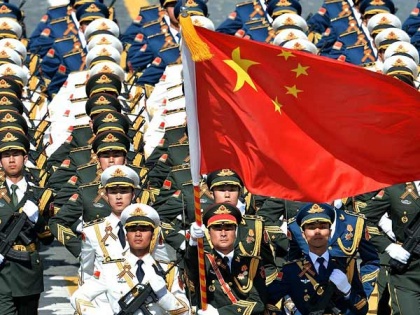China's acquisition of foreign technology companies aimed at military modernization: Report
By ANI | Published: April 16, 2023 11:29 PM2023-04-16T23:29:41+5:302023-04-16T23:30:04+5:30
Beijing [China], April 16 : China is using imports, foreign investments, commercial joint ventures, mergers and acquisitions, and industrial ...

China's acquisition of foreign technology companies aimed at military modernization: Report
Beijing [China], April 16 : China is using imports, foreign investments, commercial joint ventures, mergers and acquisitions, and industrial and technical espionage to help achieve its military modernization goals, reported Geopolitica.info.
The US Department of Defense (DoD) in its 2021 report had underlined that the Chinese strategy encompasses several methods to acquire foreign technologies, especially those in advanced commercial sectors such as Artificial Intelligence (AI) and robotics.
Beijing's strategy to support military gains through corporate takeovers remains a key part of its modernization program. For Beijing, the acquisition of foreign strategic technology compes and their capabilities play a key role in supporting the development of the People's Liberation Army (PLA), reported Geopolitica.info.
The drive is also supported by several high-level policies in China intended to develop the country's global influence and build capability in both commercial and military domains. These include China's 'Going out' strategy, the 'Made in China 2025' policy, and President Xi Jinping's 'Belt and Road Initiative,' Geopolitica.info said.
A closer look at Chinese acquisitions in the strategic technology sectors during the last five years (2017-22) reveals that while half of them were located in the US, the other 50 per cent were spread across regions including Southeast Asia, Eastern Europe, the Middle East, and Northern Africa, Geopolitica.info reported.
The largest acquisition was in 2018 and featured Wanfeng Aviation's takeover of Austria-based Diamond Aircraft, whose products include special mission aircraft designed for operations including search and rescue, and coastal surveillance, it said.
Other notable acquisitions in this period included the China Great Wall Industry Corporation, one of the country's biggest satellite manufacturers, buying Nigeria Communications Limited, also a producer of satellites, for USD 550 million; and Chinese firm Midea's takeover of another Israeli firm Servotronix, a developer of automated systems, for USD 170 million, Geopolitica.info said.
Recently, questions were raised by some MPs in the Dutch Parliament about the takeover of Leeuwarden-based company Visser BV by the Chinese company CIMC, it said.
The Dutch government informed the Parliament that the Ministry of Defence was in discussion with company Visser BV about this lapse and was considering possible actions, Geopolitica.info said.
The Dutch government stated that all the works undertaken by Visser BV from 2013 to 2022 are being currently reviewed and will be adopted in the new Defense Security Policy Bill, which is under consideration, reported Geopolitica.info.
In the past as well, contracts of Chinese compes like Hikvision and Dahua have been subject to scrutiny in the Netherlands because of the potential security risks.
The Dutch Interior Ministry had initiated an investigation with regard to security risks associated with 'Made in China' cameras.
Another Chinese entity that has been under scanner all over the world is Huawei. It is alleged that the use of Huawei cloud services in over 40 countries gave the Communist Party of China (CPC) access to systems in these countries.
Echoing these concerns, the Italian government blocked a deal between Huawei and telecommunications company Fastweb in October 2020 over the acquisition of 5G core parts and asked Fastweb to diversify its suppliers, reported Geopolitica.info.
The French cyber security agency, The Agence Nationale de la Securite des Systemes (ANSSI), also restricted the usage of Huawei equipment and plans to phase out Huawei equipment by 2028.
The Finnish government has also secured powers to ban the use of 5G equipment from suppliers considered a threat to national security. Sweden has banned the Chinese suppliers from rolling out 5G altogether and gave telecom operators until 2025 to remove Chinese gear from their infrastructure. Denmark also followed suit by not allowing equipment from countries that were not its security allies.
In Eastern Europe, various countries including Slovenia, Poland, Czech Republic, Roma, Estonia, Latvia, Slovakia and Bulgaria have indicated their intent to not let Huawei enter their 5G markets. Poland and Roma have already taken legal action to exclude non-trusted suppliers, reported Geopolitica.info.
Therefore, there is a need for increased international scrutiny of Chinese investment in local firms involved in strategic sectors, which include aerospace, semiconductors, sensors, communications, navigation, robotics, and AI.
It will not only help prevent unwanted access to classified information or defence system that is of the utmost importance for national security but also ensure strategic autonomy and security of supply, reported Geopolitica.info.
Disclaimer: This post has been auto-published from an agency feed without any modifications to the text and has not been reviewed by an editor
Open in app